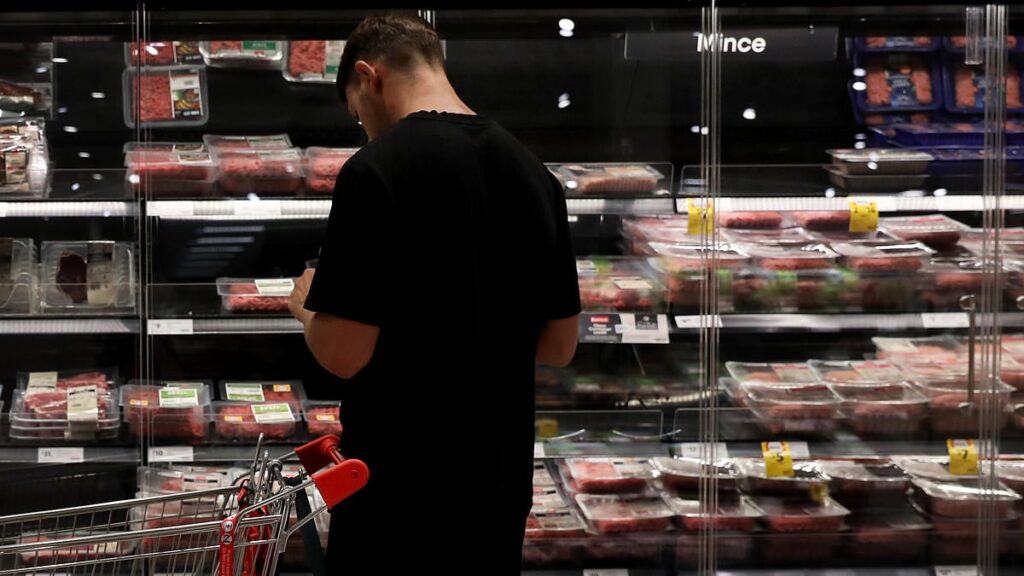- Treasurer Jim Chalmers open to ideas on GST
Anthony Albanese’s government could consider changes to the GST even though the Labor Party has long been opposed to increasing or tinkering with the consumption tax.
Items like fresh fruit and vegetables, bread, cooking oil, meat and unflavoured milk were exempted from the 10 per cent GST under a political deal reached in 1999 between former Liberal prime minister John Howard’s government and the Australian Democrats in the Senate.
Labor had lost the 1998 election campaigning against the Coalition’s proposed GST and voted against it in Parliament.
But Treasurer Jim Chalmers has revealed he would be open-minded about expanding the base of the GST to raise more government revenue, ahead of a productivity-focused roundtable in August.
This would mark the biggest change to the Goods and Services Tax since it debuted in July 2000, shortly before the Sydney Olympics.
‘What I’m going to try and do – because I know the states will have a view on it, I’m going to try not to dismiss every idea that I know that people will bring to the roundtable,’ he told the National Press Club in Canberra on Wednesday.
‘I suspect the states will have a view about the GST – it’s not a view that I’ve been attracted to historically but I’m going to try not to get in the process of shooting ideas between now and the roundtable.
‘One of the ways that I am going to be inclusive and respectful in the lead-up to this roundtable is I suspect people will raise that question.’
Anthony Albanese ‘s government could consider changes to the GST even though the Labor Party has long been opposed to tinkering with the consumption tax (pictured is the meat section of a Sydney sueprmarket)
Chalmers declined to rule out any changes to the GST, even though he’s personally opposed to increasing or expanding it.
‘I haven’t changed my view on it. And again, it’s a nice little, cheeky attempt to get a rule in, rule out in,’ he said.
It’s been a decade since state premiers called for an increase in the GST.
That’s when South Australian Labor leader Jay Weatherill and his New South Wales Liberal counterpart Mike Baird called for an increase in the rate.
Funds raised from the GST are distributed to the states and territories via the Commonwealth Grants Commission.
The funds from Canberra are often used to build things like transport infrastructure in Sydney and Melbourne, with the states leaving income-taxing powers to the Commonwealth.
The states and territories are also limited in their revenue-raising, relying on taxes like stamp duty on property sales, speeding fines and payroll taxes to pay for population growth from high immigration.
Former Liberal prime minister Tony Abbott in July 2015 backed the call of premiers to raise the GST, but two months later, Malcolm Turnbull rolled him as leader.
Treasurer Jim Chalmers has revealed he would be open-minded about expanding the base of the GST to raise more government revenue, ahead of a productivity-focused roundtable in August
New Zealand in 2010 increased the GST to 15 per cent, up from 12.5 per cent.
Australia’s 10 per cent GST is among the lowest in the world with only the United Arab Emirates (five per cent) and Thailand (seven per cent), Taiwan (five per cent), Oman (five per cent) and Jersey in the Channel Islands (five per cent) having lower consumption tax rates.
Chalmers said raising the GST would involve the need to adequately compensate low-income earners.
‘I think it’s hard to adequately compensate people,’ he said.
‘Often, an increase in the GST is spent three or four times over by the time people are finished with all of the things they want to do with it.’
Australia is also particularly reliant on revenue from personal income taxes.
The federal government is expecting to collect $349.7billion from income taxes in 2025-26, making up 51.7 per cent of the Commonwealth’s $676.1billion in revenue.
By the 2028-29 financial year, Treasury is expecting personal income taxes to make up 54 per cent of revenue as receipts from individuals soared to $420.3billion from a total collection pool of $778.3billion.
